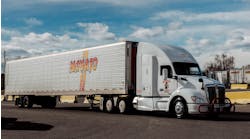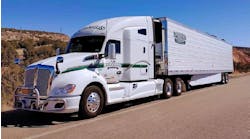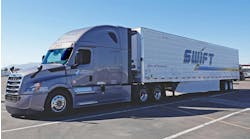Ingles Markets Offers Job Switch Driver Training
Starting in-house produce distribution in 1995, Ingles Markets faced the task of hiring 40 new drivers. Since then, the supermarket chain's fleet has grown from 77 tractors to 112. The additional power was purchased after Ingles added a 165,000-sq-ft cooler to its existing 594,000-sq-ft warehouse in Black Mountain, North Carolina.
Ingles began grocery distribution in 1977. Before that, it bought from a wholesale grocer. From 1977 until 1983, Ingles continued to buy produce, meat, and dairy products from a wholesaler. Internal meat, dairy, and deli distribution began in 1983 and produce was added in 1995, giving Ingles control of all perishables distribution. However, the wholesaler, MDI in Hickory, North Carolina, continues to supply frozen foods. The Ingles supermarket chain has 207 stores in six southeastern states.
Hiring those 40 new drivers was relatively easy because Ingles has a good reputation among drivers. “We don't have trouble finding drivers,” says Dan Smith, Ingles' transportation director. “Even when we surged by 40 new drivers, we had a big stack of applications.”
Today, Ingles has 160 drivers and a good retention rate. Driver turnover is less than 3% per year, Smith says. Many drivers have 10 to 15 years' experience. To build up driver loyalty, Ingles recently developed a new internal training program that allows employees to switch assignments and become drivers. Warehouse workers with at least five years' experience may train as drivers, gaining career advancement and higher wages.
“By providing extensive training, we offer a comfortable way for warehouse workers to advance,” he says. “And we help ensure safe operation. So far, two workers have completed the training, and two more have started. The program is working well. Recent graduates are happy and doing a good job.”
For the first three weeks, trainees accompany experienced drivers and work various jobs in distribution. Leaving the distribution center about 2 am provides trainees a sobering look at the reality of being a driver and an opportunity to reflect on whether they really want to change jobs, Smith says. Working with dispatch and the maintenance shop helps them better understand fleet support services.
“Later, if they decide to continue, we have them work the yard switching trailers for at least three months,” he says. “This helps them get used to the mechanics of operating a tractor. We evaluate them at that point to see if they are ready to continue training. During the next phase, trainees accompany local-delivery drivers — 50% of the time as passengers and 50% as drivers. These routes remain within a 75-mile radius. This stage lasts nine months. During the final three months, they begin making longer runs. Our trade area extends out 315 miles.”
By the time trainees finish switching trailers in the yard, they have earned a commercial driver license, Smith adds. At the end of in-house training, new drivers are sent to Alliance Truck Training in nearby Fletcher, North Carolina, to receive third-party certification.
The lengthy internal training stems from Ingles' long-standing policy of hiring only experienced drivers. Those hired from outside the company must have at least five years' commercial driving experience, no traffic citations in the past three years, and no chargeable accidents for five years. After checking driver records, Ingles interviews candidates to verify qualifications and suitability.
“Drivers are a tough breed,” Smith says. “They deal with tight schedules and changing road conditions. Even though our drivers operate in big cities, they sometimes contend with snow, heat, mountainous terrain, and two-lane roads. Our drivers do a tremendous job, and we try to provide them the best equipment.”
Mostly One-Day Runs
Most routes are completed in one day, an important factor for driver retention. “Drivers who come to us from longhaul work think they have died and gone to heaven,” Smith says.
Most Ingles stores are in western North Carolina, northwestern South Carolina, and eastern Tennessee. They also have three stores in southwestern Virginia as well as stores in the Atlanta suburbs and one in Alabama.
“We're all around Atlanta, but we don't deliver inside the loop,” says Peter Sprague Jr, Ingles' logistics manager. “We concentrate on suburbs. In the Atlanta area, we knock heads with Publix. In North Carolina, we compete with Harris Teeter. We have good market share in the western part of the state. We cover the Interstate 85 corridor from Charlotte to Spartanburg, Greenville, and Anderson, South Carolina, and on to Atlanta. Heading west, we deliver to Chattanooga, Knoxville, and Johnson City, Tennessee.”
Ingles delivers about 900 loads per week. About half are perishable, and the other half dry groceries. Though groceries and perishables usually travel in separate trailers, the company mixes loads for outlying stores — for example, in Virginia. “Stores receive perishables three times a week, on Monday, Wednesday, and Friday, or Tuesday, Thursday, and Saturday. Groceries deliver throughout the week,” Sprague says. “Dry loads deliver on Sunday, but not perishables. All stores receive two to four dry deliveries a week, depending on volume, and they all receive three perishable deliveries.”
Drivers bid on runs assigned by seniority every six months. “We don't pay by the mile or by the hour, but by the run, and each run has a different price tag,” he says.
A typical day starts early. Perishables runs begin between 3 and 5 am and end by about 9 am. Most drivers handle a second run of dry groceries. Typically, grocery runs finish by 3 pm, making for a long day. The same tractor makes both runs, Sprague says. Some drivers prefer to work part-time and share tractors.
Longhaul drivers, particularly with overnight routes, may leave as early as 2 am. Whenever possible, they pick up backhauls on the inbound leg. For instance, a route to Woodbury, Georgia, about 50 miles south of Atlanta, makes that stop and another one in Griffin, about 30 miles south of Atlanta. After a pick-up in Atlanta, the driver may take a hotel room in Lavonia, Georgia, on the Georgia/South Carolina border before returning to Black Mountain early the next morning.
160 Backhauls a Week
Ingles backhauls about 160 loads a week and works to control all inbound freight. By picking up backhauls and specifying inbound carriers when possible, Ingles receives freight-rate reductions, Sprague says.
“MDI, the wholesaler in Hickory, delivers frozen foods directly to stores,” Sprague says. “We warehouse and deliver most other products, except health and beauty items, and general merchandise, which cross-dock from MDI at our distribution center. We receive three to four cross-dock loads per day from MDI.”
Ingles also cross-docks milk from its dairy in Asheville, North Carolina, about 15 miles west of Black Mountain, he adds. About 10 to 15 milk loads a day shuttle from the dairy to the distribution center. Milk is consolidated with meat, produce, and other perishables. Trailers are kept at 38° F. Plastic blankets protect bananas, potatoes, onions, and other items that require a higher temperature.
Bananas are the highest-volume produce at Ingles. The Black Mountain distribution center has 12 banana rooms. The first 10 rooms were installed in 1995. Ingles installed the last two banana rooms about a year ago.
“Bananas go through seven stages of ripening,” says Baxter Eller, a technical coordinator. “They change color from green to yellow, to yellow with brown spots. We ship them at stage two or three, when they are a mixture of green and yellow.”
On average, Ingles receives two truckloads of bananas a day from ports in New Jersey, Florida, and Texas and ships 2,000 cases a day. Eller's job is to inspect incoming loads and determine ripening needs. The whole process takes about four days. Each room has two fans and a cooling evaporator. During ripening, a tiny amount of ethylene gas is injected. The rooms are kept at 90% relative humidity. When gassed, the rooms warm to 62° to 64° F, but bananas are stored at 57° F, Eller says.
Designed by The Facility Group in Smyrna, Georgia, the 165,000-sq-ft cooler has ammonia refrigeration. Storage temperatures range from 28° to 57° F. The dock is kept at 35° F and has 34 doors. The entire warehouse, including dry groceries, has a total of 102 doors.
Ingles purchases fleet equipment from various suppliers depending on price, warranty, and ease of service, Sprague says. The 112 tractors include 20 new Sterling AT9500 conventionals and late-model Freightliners and Volvos. The company operates 175 refrigerated trailers and 250 dry vans.
New refrigerated trailers are 48 footers from Utility and Trailmobile, and part of a total fleet of thirty 48-ft reefers. Older trailers are 46 footers from Wabash National and Great Dane. They hold 22 pallets, enough to serve two stores, Sprague says. Refrigerated trailers are equipped with flat, non-slip aluminum floors and overhead doors to minimize loss of refrigerated air at delivery stops.
“We purchase only new equipment, replacing tractors every six years and trailers after 10 years of service,” he says. “We used to buy a lot of used trailers, but in 1994 we started buying new trailers to maintain product integrity better and to promote a quality image.”
Refrigerated trailers are equipped with a mix of Thermo King and Carrier Transicold units. New 48-ft trailers have Thermo King SB-IIIs while others are equipped with Thermo King Super II Max or Carrier Transicold Optima units. Carrier Transicold and Thermo King both regularly send service trucks to the Ingles distribution center to check units. Both companies also provide training for Ingles' 20 mechanics.
Other suppliers also provide training for Ingles' technicians, Sprague says. On average, training is held once a month. Many of these sessions are held at the company shop, but Ingles also encourages technicians to travel for training. For instance, two or three times a year two mechanics are sent to a brake clinic in Atlanta.
The five-bay shop operates seven days a week, 24 hours a day, except from 4 to 9 pm on Saturday. Mechanics concentrate on preventive maintenance, says Van Draper, fleet maintenance manager. “Equipment uptime is critical,” he says. “On average, our tractors log 120,000 miles a year. We bring tractors into the shop every 8,000 miles for the ‘A’ service that includes a chassis lube and inspection. At 16,000-mile intervals, we do the ‘B’ service that includes the ‘A’ plus an engine oil and filter change. Ninety percent of our work is PM, and the other 10% is anything from replacing light bulbs to engine head gaskets.”
Trailers are serviced every three months, says George Fite, who coordinates trailer work for the shop. Chassis are lubricated and wheels, tires, and brakes are checked. Trailers also are checked for body damage. Ingles sends body repair work to an outside service provider, Fite says.
Reliable equipment is essential for Ingles to achieve its goal of getting the right product to stores on time and in good condition. “In the grocery business, the main thing is volume,” Smith says. “We want to run our equipment as efficiently as possible.”


